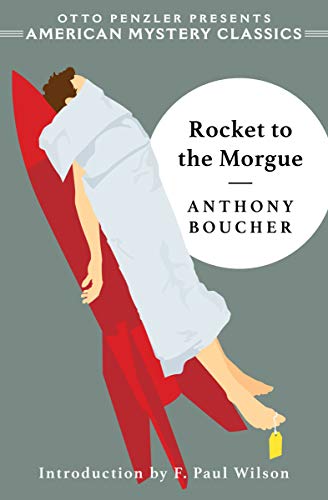
By Lis Carey: Police Detective Lt. Terence Marshall, of the Los Angeles Police Department, is home with his wife, Leona, feeding their new baby, while she asks about his day. Nothing interesting, he tells her. One dead drifter, though, shot dead in a very cheap hotel. A couple of odd things, though. He had $300 on him, that wasn’t stolen, and an unusual rosary, with what seems to be the wrong number of beads.
It’s a puzzle.
It’s a bigger, more important puzzle, when they discover the dead man also has the private phone number of Hilary Foulkes, heir and literary executor of the late giant of science fiction, Fowler Foulkes, author the adventures of Dr. Derringer. Derringer has outlived Fowler, or would, if not for the fact that Hilary Foulkes charges extremely high fees for any use of Derringer’s name, image, or adventures. He’s killed many literary projects, original adventures, quotes of memorable lines as chapter headers, even audio records for the National Library for the Blind. A lot of people really hate Hilary Foulkes.
And Hilary Foulkes reports that he has been getting threats and has experienced actual attempts on his life — so far, not successful or even there impressive, but still, attempts on his life.
Soon Marshall is investigating a locked-room attempted murder, questioning a selection of potential suspects from the Mañana Literary Society, the informal social circle of the science fiction writers living in and around Los Angeles at the time. For dedicated science fiction fans, this adds some extra fun, because these writers are mostly thinly disguised major sf writers of the period. However, if you’re only here for the mystery, you won’t notice, and it won’t distract from the story. This is a solid mystery, well plotted, and the characters, sf writers or not, are developed and interesting.
One of the suspects is a friend of Marshall’s; one very helpful amateur detective is Sister Ursula of the Order of St. Mary of Bethany, who has a keen, observant mind, and useful background knowledge about the strange rosary, which turns out to be quite relevant. With the story not only set in 1942, but written then, one could be concerned about the women characters. However, Boucher doesn’t fall into the trap of much of both the sf and mystery fiction of the period. The women are described physically as you’d expect, tall and bosomy, but they’re smart and capable, though they don’t always make it obvious.
I just really thoroughly enjoyed this.
Recommended.
Discover more from File 770
Subscribe to get the latest posts sent to your email.

I really appreciate your reviews. If you like something, I probably will, too! Many thanks.
@Msb–Thank you!
Marshall and Leona meet in “Nine Times Nine”, which is also worth reading.
Not so by the way – not a Spoiler, just a footnote with attendant groans after more than 15 minutes of trying and failing to reach the copy on a top bookshelf behind many other books – my memory is that the “Anthony Boucher” character testifies about a capability. And – my footnote – it is a capability that Boucher himself possessed. (Maybe Wilson mentions it in his intro? I don’t have this edition.) In any case, be it noted: When Mom’s first story was published in F&SF, she offered to use a pseudonym or otherwise disguise her identity as a female contributor. Boucher’s response was that he wanted readers to know that women could not only READ F&SF, they could WRITE it, as well. And the cover of THE MAGAZINE OF FANTASY AND SCIENCE FICTION #3 included the line “and stories by BETSY CURTIS, HENDERSON STARKE, PHILIP CARTER.”
Thanks for the review. I’ve got a copy of this that I haven’t read yet. When Hugo-reading is done, perhaps I’ll finally get to it.
@Maggie Thompson–Yes, Wilson does mention it. The intro is worth reading; not always the case.
Thank you!!!
I didn’t know that ancient classic was back in print. A cursory skim of the review, and I was off to Amazon to order it. I was lucky–they said “1 still in stock.” For the hardcover, at least–and I tend to buy hc when available. I should have it within a week.
There are more Sister Ursula stories in the posthumous Boucher collection Exeunt Murderers. A lot of his crime story criticism is collected in Multiplying Villainies, which I like to read again once in a while.
Fun. I’ve really only read his SF (some real classics in short SFF), but this sounds great. Thanks.
Good to see this entertaining novel remembered! I read it back in the late 70’s (I think) and enjoyed it hugely. I was new to fandom, and got a big kick out of the references. Seeing your review made me think I might reread it, but was hugely shocked to discover that IT’S NOT AT THE LIBRARY! Kind of hard to find–which is a loss.
@michaele–It is available on Amazon, though, if that’s an option for you.
@Lis Carey: No, Wilson does not mention it in the intro. I was happy to buy this copy (given my inability to reach the paperback on a top back shelf) and was able to check. The pertinent lines are:
Page 209: “It’s not just Foulkeses … Tony Boucher can do that too.”
Page 213: “If we need to, we’ll get Henderson’s friend Boucher on the stand to demonstrate how it was done.”
Because, yes, the real-life (albeit pseudonymous) Anthony Boucher could do it.
Pingback: Never Mind The News – File 770’s Best Feature Articles of 2022 | File 770